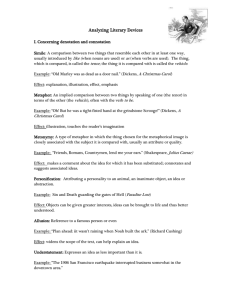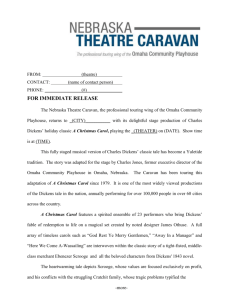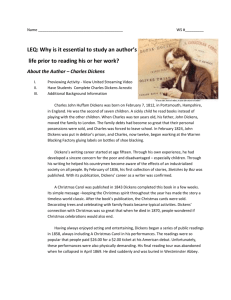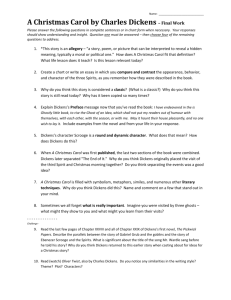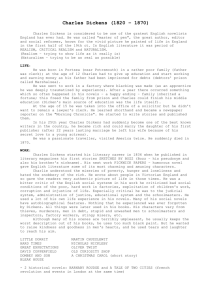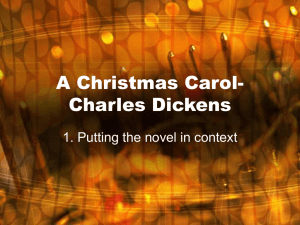Vikrant Sagar and Prachi Maheshwari
advertisement
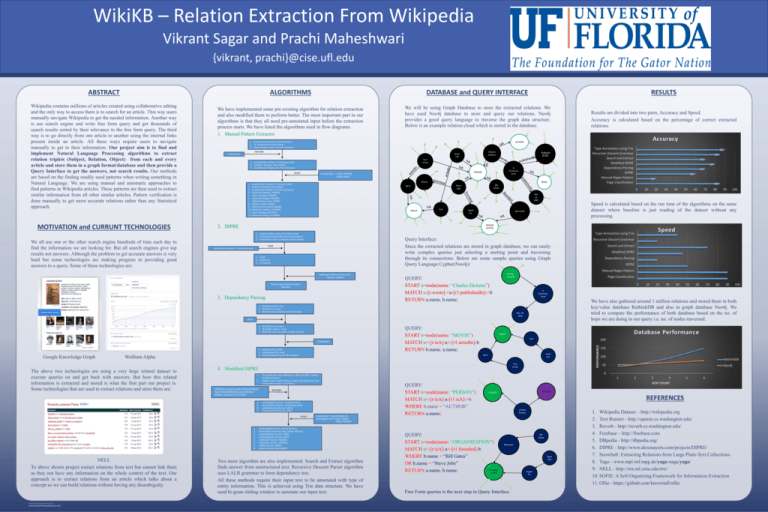
WikiKB – Relation Extraction From Wikipedia
Vikrant Sagar and Prachi Maheshwari
{vikrant, prachi}@cise.ufl.edu
ABSTRACT
Wikipedia contains millions of articles created using collaborative editing
and the only way to access them is to search for an article. This way users
manually navigate Wikipedia to get the needed information. Another way
is use search engine and write free form query and get thousands of
search results sorted by their relevance to the free form query. The third
way is to go directly from one article to another using the internal links
present inside an article. All these ways require users to navigate
manually to get to their information. Our project aim is to find and
implement Natural Language Processing algorithms to extract
relation triplets (Subject, Relation, Object) from each and every
article and store them in a graph format/database and then provide a
Query Interface to get the answers, not search results. Our methods
are based on the finding readily used patterns when writing something in
Natural Language. We are using manual and automatic approaches to
find patterns in Wikipedia articles. These patterns are then used to extract
similar information from all other similar articles. Pattern verification is
done manually to get more accurate relations rather than any Statistical
approach.
MOTIVATION and CURRUNT TECHNOLOGIES
We all use one or the other search engine hundreds of time each day to
find the information we are looking for. But all search engines give top
results not answers. Although the problem to get accurate answers is very
hard but some technologies are making progress in providing good
answers to a query. Some of these technologies are:
ALGORITHMS
DATABASE and QUERY INTERFACE
RESULTS
We have implemented some pre-existing algorithm for relation extraction
and also modified them to perform better. The most important part in our
algorithms is that they all need pre-annotated input before the extraction
process starts. We have listed the algorithms used in flow diagrams.
1. Manual Pattern Extractor
We will be using Graph Database to store the extracted relations. We
have used Neo4j database to store and query our relations. Neo4j
provides a good query language to traverse the graph data structure.
Below is an example relation cloud which is stored in the database.
Results are divided into two parts, Accuracy and Speed.
Accuracy is calculated based on the percentage of correct extracted
relations.
1. Charles Dickens wrote A Christmas Carol
2. J.K. Rowling wrote Harry Potter
3. Chetan Bhagat wrote Five Point Someone
PATTERN
$x wrote $y
Accuracy
AUTHOR
Charles
Dickens
Brad
Pitt
Chapman
& Hall
Tom
Cruise
1. wrote(Charles Dickens, A Christmas Carol)
2. wrote(J.K. Rowling, Harry Potter)
3. wrote(Chetan Bhagat, Five Point Someone
RULES
A
Christmas
Carol
PERSON
wrote($x,$y) --> isA($x, PERSON)
isA($y, BOOK)
iPhone
1. wrote(Charles Dickens, A Christmas Carol)
2. wrote(J.K. Rowling, Harry Potter)
3. wrote(Chetan Bhagat, Five Point Someone)
4. isA(Charles Dickens, PERSON)
5. isA(J.K. Rowling, PERSON)
6. isA(Chetan Bhagat, PERSON)
7. isA(A Christmas Carol, BOOK)
8. isA(Harry Potter, BOOK)
9. isA(Five Point Someone,BOOK)
10. isA(Charles Dickens, AUTHOR)
11. isA(J.K. Rowling, AUTHOR)
12. isA(Chetan Bhagat, AUTHOR)
BOOK
Bill
Gates
Steve
Jobs
MI:4
Type Annotation using Trie
Recursive Descent Grammar
Search and Extract
Modified DIPRE
Dependency Parsing
DIPRE
Manual Regex Pattern
Page Classification
90
85
70
80
70
60
20
85
0
10
30
40
50
60
70
80
90
100
Dec
19,
1843
MOVIE
Troy
Apple
Inc.
Speed is calculated based on the run time of the algorithms on the same
dataset where baseline is just reading of the dataset without any
processing.
Microsoft
ORGANI
ZATION
2. DIPRE
Speed
Type Annotation using Trie
1. Charles Dickens wrote A Christmas Carol
2. A Christmas Carol written by Charles Dickens
3. A Christmas Carol is a book by Charles Dickens
Query Interface:
Since the extracted relations are stored in graph database, we can easily
write complex queries just selecting a starting point and traversing
through its connections. Below are some sample queries using Graph
Query Language Cypher(Neo4j):
SEED
seed(Charles Dickens, A Christmas Carol)
20
1. wrote
2. written by
3. is a book by
Recursive Descent Grammar
Search and Extract
Modified DIPRE
Dependency Parsing
DIPRE
Manual Regex Pattern
Patterns generated are used in
Method 1
3. Dependency Parsing
Charles
Dickens
QUERY:
START n=node(name: “Charles Dickens”)
MATCH n-[r:wrote]->a-[r1:publishedIn]->b
RETURN a.name, b.name;
Page Classification
0
1. Brad Pitt acted in Troy.
2. Brad Pitt is an actor.
3. Brad Pitt was married to Jennifer Aniston.
OLLIE
CONVERTER
Google Knowledge Graph
1. isA(Brad Pitt, ACTOR)
2. actedIn(Brad Pitt, Troy)
3. marriedTo(Brad Pitt, Jennifer Aniston)
Wolfram Alpha
The above two technologies are using a very large related dataset to
execute queries on and get back with answers. But how this related
information is extracted and stored is what the first part our project is.
Some technologies that are used to extract relations and store them are:
The Kite Runner was published in 2003 and 2007 is written
by Khaled Hosseni.
English writer Charles Dickens wrote A Christmas Carol and
several other books in his lifetime.
2.
“[$BOOK]+ [written by] [$AUTHOR|$PERSON]”
“[$AUTHOR|$PERSON] [wrote] [$BOOK]+”
“[$BOOK] [published in] [$YEAR]”
PATTERN
writtenBy(Kite Runner, Khaled Hosseni)
wrote(Charles Dickens, A Christmas Carol)
publishedIn(Kite Runner, 2003)
publishedIn(Kite Runner, 2007)
1.
2.
3.
4.
5.
6.
7.
8.
www.PosterPresentations.com
wrote($x,$y) writtenBy($2,$1)
writenBy($1, $2) isA($1, BOOK}
isA($2, PERSON)
writtenBy(Kite Runner, Khaled Hosseni)
writtenBy(A Christmas Carol, Charles Dickens)
publishedIn(Kite Runner, 2003)
publishedIn(Kite Runner, 2007)
isA(Khaled Hosseni, PERSON)
isA(Charles Dickens, PERSON)
isA(Kite Runner, BOOK)
isA(A Christmas Carol, BOOK)
Two more algorithm are also implemented. Search and Extract algorithm
finds answer from unstructured text. Recursive Descent Parser algorithm
uses LALR grammar to form dependency tree.
All these methods require their input text to be annotated with type of
entity information. This is achieved using Trie data structure. We have
used bi-gram sliding window to annotate our input text.
40
50
60
70
80
90
Brad
Pitt
150
100
RethinkDB
50
Neo4j
0
1
QUERY:
START n=node(name: “PERSON”)
MATCH n<-[r:isA]-a-[r1:isA]->b
WHERE b.name = “AUTHOR”
RETURN a.name;
2
3
4
HOP COUNT
5
6
AUTHOR
PERSON
QUERY:
START n=node(name: “ORGANIZATION”)
MATCH n<-[r:isA]-a<-[r1:founded]-b
WHERE b.name = “Bill Gates”
OR b.name = “Steve Jobs”
ORGANIZ
RETURN a.name, b.name;
ATION
100
200
MI:4
RULES
RESEARCH POSTER PRESENTATION DESIGN © 2012
Troy
Tom
Cruise
1.
30
Database Performance
MOVIE
4. Modified DIPRE
1.
2.
3.
4.
NELL
To above shown project extract relations from text but cannot link them
as they not have any information on the whole context of the text. Our
approach is to extract relations from an article which talks about a
concept so we can build relations without having any disambiguity.
QUERY:
START n=node(name: “MOVIE”)
MATCH n<-[r:isA]-a<-[r1:actedIn]-b
RETURN b.name, a.name;
20
We have also gathered around 1 million relations and stored them in both
key/value database RethinkDB and also in graph database Neo4j. We
tried to compare the performance of both database based on the no. of
hops we are doing in our query i.e. no. of nodes traversed.
Dec 19,
1843
1. (Brad Pitt, is an, actor)
2. (Brad Pitt, acted in, Troy)
3. (Brad Pitt, was married to, Jennifer Aniston)
10
A
Christmas
Carol
PERFORMANCE
Statistical model to remove nonrelevant relations
REFERENCES
Charles
Dickens
Bill
Gates
Microsoft
Free Form queries is the next step in Query Interface.
Steve
Jobs
Apple
Inc.
1. Wikipedia Dataset – http://wikipedia.org
2. Text Runner - http://openie.cs.washington.edu/
3. Reverb - http://reverb.cs.washington.edu/
4. Freebase – http://freebase.com
5. DBpedia - http://dbpedia.org/
6. DIPRE - http://www.alexmayers.com/projects/DIPRE/
7. Snowball: Extracting Relations from Large Plain-Text Collections
8. Yago - www.mpi-inf.mpg.de/yago-naga/yago/
9. NELL - http://rtw.ml.cmu.edu/rtw/
10. SOFIE: A Self-Organizing Framework for Information Extraction
11. Ollie - https://github.com/knowitall/ollie
